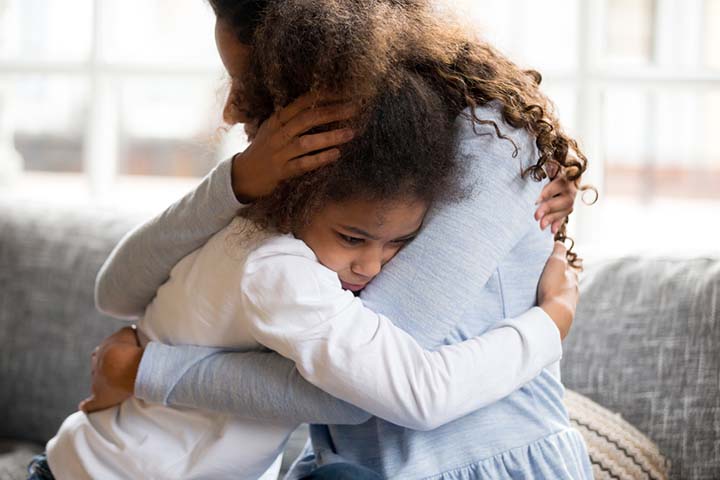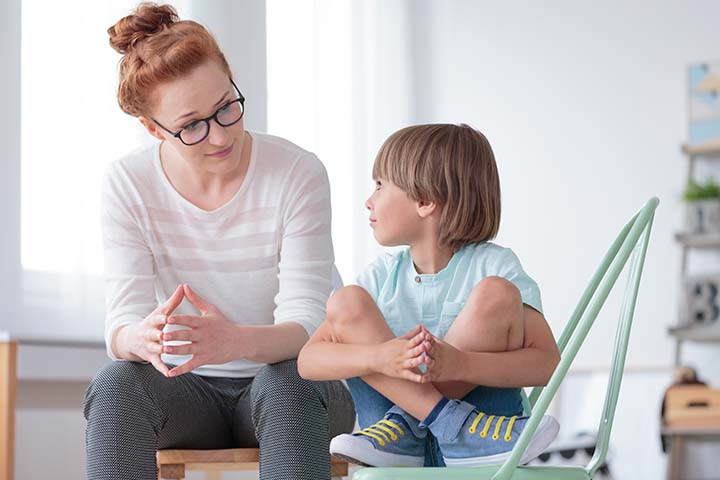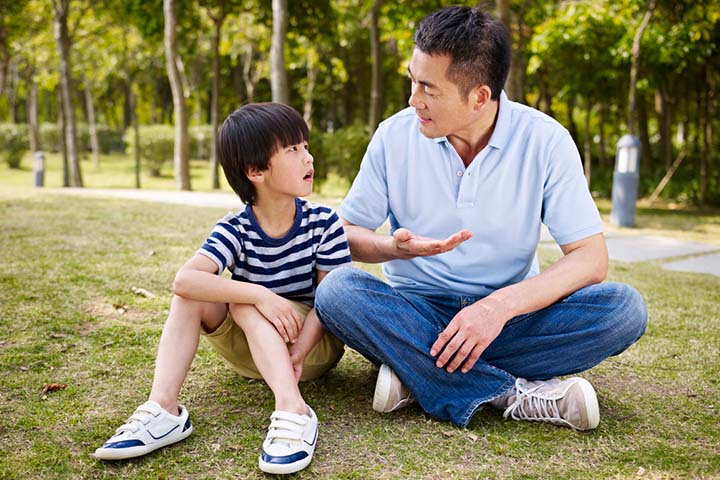
Image: Shutterstock
Most scared kids feel like their parents’ arms are the safest place.When parents hug their children, it provides them reassurance and the sense of security they crave.However, children need to learn to deal with their fears, be it the fear of scary monsters, the dark, or going to school, to develop their personality.
While showering them with love, security, and affection, one should also focus on empowering their child to learn how to deal with their fears and, when needed, how to ask for help. This skill will benefit them throughout their lifetime.
Read this post as we explain some common factors that trigger fear in kids and offer some tips on how to help your child overcome these fears.
What Causes A Child To Be Scared?
Children are scared of many things, including the dark, new places, heights, and school. But why do they fear these? Why are some children more scared than others or fear the same thing far more than their peers? Here are some common causes of childhood fears(1)(2):
- Genetic or family factors:Genetic or family factors can make a child more susceptible to fears and make them react more severely to specific fears. A child might get anxiety attacks if one or both parents had a history of anxiety attacks.The child might also have picked up fear by watching the parents’ anxious behavior.
- Biological factors:神经递质,传输mes的化学物质sages to and from the brain, control how anxious or fearful a person feels. If the child’s serotonin and dopamine levels (two important neurotransmitters) are off the normal range, they could experience excessive fear or anxiety.
Image: IStock
- Experiences and circumstances:The situation or environment the child finds themselves in can also affect how anxious or scared they feel. For example, if the parents have been fighting a lot or a loved one has recently passed away, these circumstances could spark fear and anxiety in a child. At times, a major event, such as relocation to a new place or admission to a new school, could also scare children.
孩子怕什么?
Aschildren grow, you will often find that their fears also change(1).For example, newborns cry out in fear when they hear loud noises, six-month-olds may howl with fear when a stranger approaches, one-year-olds may feel separation anxiety and seem terrified when a parent leaves for work, and pre-schoolers may balk at the idea of starting school and leaving their parents behind at home(3).Even older children and adolescents have their fears.
The most common fears inyoung childreninclude
- Dark places or darkness
- Monsters
- Strangers
- Big animals (or even dogs)
- Heights
Image: IStock
- Separation from parents or other beloved family members
- Thunderstorms or lightning
- Kidnapping, getting lost, burglary (older children may fear these)
Your child’sfears may indicate what they have been exposed to recently. If there has been news of a massive fire, they may fear fire, or if a kidnapping has been making headlines lately, they could fear that.
Usually, these common fears subside as the child grows and realizes that they are unfounded.If they become persistent and intense and affect the child’s quality of life, consult a doctor or therapist.
 Point to consider
Point to consider20 Tips To Teach Your Child Not To Be Scared
Most childhood fears can be overcome if the parents know how to address them. Read on to learn some useful tips you can employ. These tips are useful in helping kids with fear.
- 是there:Often, all that a scared child needs is reassurance. Teaching them to deal with fears independently is a gradual process. Thus, hugging them or taking them in your lap and comforting them can calm them down and make them feel secure.
Image: IStock
- Talk it out: Cajole the child into telling you what they are scared of when they have calmed down.This can help you get to the bottom of their fears, making it possible to address the root cause efficiently. Listen without interrupting and do not tease them about their fear or trivialize it.
- Empathize:There is nothing more scary to a child than believing that they cannot turn to their parents for help. Showing empathy and concern tells your child that you are not writing off their fear but are taking it seriously. This builds trust, and children are more likely to open up to you. If you brush their fear aside, they may not come to you the next time they are scared, and you will never know what is stopping them from certain activities.
- Make a plan:Involve the child in the getting-over-fear process and make a plan with them. For example, if the child is scared of the dark and refuses to sleep alone at night, let them choose a night lamp.
 Quick tip
Quick tip- Encourage self-regulation:Teach your childhow to build self-regulation, that is, the ability to deal with their emotions and thoughts healthily. It takes time, but the child will learn to understand the fear, pause before acting or reacting to it, and realize that they can overcome it.
Image: Shutterstock
- Do not overreact:Childhood fears are not a sign of abnormality or illness in children. They are a part of the normalgrowing-up process(4).As a parent, you should avoid over-reacting to anxiety in children and feeding into it.Deal with these incidents calmly and confidently, knowing that your child will get over them soon.
You can consult with your pediatrician to shortlist effective anxiety management techniques suitable for managing fear in children.
- Use distractions:Distract your child from their fear by involving them in an activity. Also, letting them do physical activities with other children can boost their confidence and help them see how other children do not seem to be affected by the things that they fear.
- Boost realistic thinking:Logical thinking is a powerful tool that you can use to let your child overcome their fears. Help the child think logically and practically, and let them understand how their fear is unfounded. Ask them to list their fears and then think about them with a clear mind, replacing the fears with facts.
- Don’t get impatient:As long as the child shows some improvement and puts in the effort, let them get over their fear at their own pace. Rushing them along may worsen the situation. Remember that children can sense your impatience, which could prevent them from opening up to you.
- Do not avoid activities:Do not let the child avoid an activity just because they fear something associated with it. For example, if they are afraid of strangers and refuse to go to the park to play, the right way to handle it is to ease them into going there and not force them. You could let them play close to you at first and then gradually ease them into playing with friends until they are over the fear of unknown faces at the park.
- Do not be too involved:Encourage the child to deal with their fears independently. While it is important to offer reassurance and security when the child comes to you terrified, it is also crucial that you do not get too involved, presenting yourself every single time. Instead, gently get them to come up with solutions to the problem and then praise them for finding the way. This tells them that they can get rid of the fear even if you are not around to reassure them.
- Don’t overly reassure:Many parents of children with anxieties are guilty of overly comforting the little ones. This can prove impractical in some cases. For example, if the child suffers from separation anxiety and you assure them saying,“I am not going anywhere,”that could prove counterproductive when you go out to work the next day. The child may stop trusting your words. Therefore, consult with your pediatrician to identify the ways for coping with anxiety.
- Encourage expression:Let the child freely communicate with you. Never dismiss it as something inconsequential in a bid to make them stop thinking about it. If you have come up with an action plan to deal with the fear, encourage the child to share how they feel after crossing the first hurdle. Instead of talking about the fear itself, keep the conversation focused on how the child has already taken one step forward in conquering it. Ask the child for suggestions and make plans to solve the problem.
Image: IStock
- Validate, then move on:Once your child has opened up about what is scaring them, validate it before you move on from it. Validating it with an“Oh, now I understand why you woke up!”or“Yes, that does sound scary”helps the child see that you are not brushing it off. Once you validate the fear, avoid talking at length about the fear itself.
- Help find ways to talk about it:The child knows what is scaring them, but they may not always know how to communicate it to you accurately. Ask relevant questions based on your assessment of their fear. For example, if your child is afraid that you will fall ill, gently ask if they have this fear because of the coronavirus pandemic. Let them express why they fear you will be infected. Next, talk to them about the precautions you take.
- Break the fear into manageable pieces:Fears can seem overwhelming and unmanageable to children. Break them up into smaller andmanageable challengesthat the child can handle more easily. For example, if the child is afraid to stay with a caretaker while you are out managing your chores, ask them if they would be more comfortable with a relative. The next step could be a short stint with a caretaker while you work in another room. Next, you can let them stay with the caretaker while you go out for a short while.
- Offer encouragement:You are your child’s biggest cheerleader, the person they trust most and look up to. When you tell them they are doing good, they believe you, and they gain self-confidence. When the child comes to you with their fears, assure them that they are brave enough to deal with them. Encourage them to talk about it and share what they feel. Keep motivating them to take the right steps even if they suffer a few setbacks.
- Reward every step forward:Do not wait for them to overcome the fear before your reward them. Celebrate every little progress so that they are always motivated to get over the fear.
- Get professional advice:Some childhood fears are not easy to get over. Do not hesitate to check with a child health nurse or a therapist to approach the problem. Do this at the earliest if the fear disrupts the child’s life or affects their mental or physical well-being.
- Do not use fear as a tool:Countless times we have seen parents threaten their children with monsters taking them or doctor giving them an injection to make them listen. But this is counterproductive in the long run as this instils fear of that particular object in the child. This becomes difficult to get rid of fear.
常见问题
1. What is an irrational childhood fear?
Irrational fears are those when there is no practical threat. Phobias are said to be strong and irrational fears. For example, a child may be phobic of dogs that they may refuse to go outdoors (5).
2. What does fear do to a child?
Typical childhood fears are perceived as a part of normal development in most children. However, a few may develop anxiety issues, which may be worrisome (6).
3. Should I be worried if kids are scared of everything?
Kids usually outgrow common fears. However, if their fears are extreme and interfere with their normal course of life, they may have anxiety disorders. It is wise to talk to a doctor in such cases (7).
There are numerous things that a child may be afraid of. Getting rid of their fears could help them figure out what’s causing them and intervene accordingly. Address their concerns and reassure them that they are safe. It may be beneficial to divert scared children’s attention away from the topic without overreacting to it. You might also try utilizing logical reasoning to assist them in breaking down and conquering their anxieties gradually. Because children look to adults for security, be patient when they seek your assistance in dealing with their worries. If none of those above-mentioned methods work, you might want to seek expert help.
Infographic: Is It Fear Or A Phobia?
Is your child just going through a phase, or do their fears of different situations and objects have a deeper meaning? The thin line between fear and phobia should not be missed since phobias may have a greater impact on their mind and daily activities. So, understand how to differentiate your child’s fears from their phobias through this infographic below.

Illustration: Momjunction Design Team
Get high-quality PDF version by clicking below.
Download Infographic
Key Pointers
- Children’s fears may spring from family history, a traumatic experience, or neurological reasons.
- Fears can keep changing with age, some of the common ones being darkness, monsters, and separation.
- Try not to be overprotective, but rather to assist them through logic or professional assistance.
References:
2.Phobias Symptoms & Causes, Boston Children’s Hospital
3.Anxiety, Fears, and Phobias, Johns Hopkins Medicine
4.How to Help Children Manage Fears; Child Mind Institute
5.Understanding Childhood Fears and Anxieties;American Academy of Pediatrics
6. P Muris et al.;How serious are common childhood fears?; NCBI
7.Normal Childhood Fears; Nemours Children’s Health
8.Helping Kids Get Over their Fears; Stanford Medicine Children’s Health





















